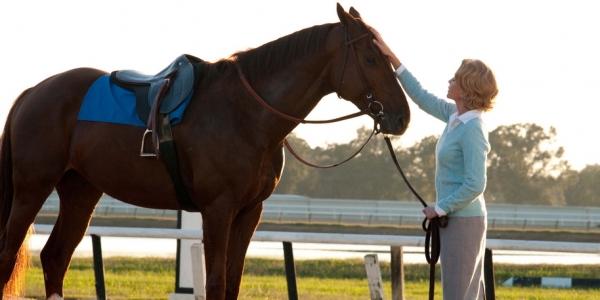Secretariat was the last horse to win racing’s fabled Triple Crown, way back in 1973, and its winning margin and time in the Belmont Stakes has never been bettered. However, Secretariat is not as much about the champion horse as it is about its relationship with its devoted owner Penny Chenery, a Vermont housewife and former lawyer, who inherits the horse as part of a deal after her mother dies.
With her ailing father (Scott Glenn, wasted in a thankless role) unable to run the family’s horse ranch any longer, Penny agrees to sell one of the pregnant foals. Thanks to the toss of a coin, the astute Penny inherits the foal that will give birth to the horse that becomes Secretariat. She hires Lucien Laurin (JohnMalkovich), a washed up trainer who is unsuccessfully contemplating retirement to become the horse’s trainer. Lucien is a flamboyant character with an eccentric and colourful dress sense, and he carries around press clippings of all his losing races to inspire himself.
Between the two of them they produce a spirited colt who just wants to run. As Penny herself says: “You never know how far you can go until you run.” Her rivalry with Pancho Martin (Nestor Serrano), the arrogant owner of Secretariat’s main rival Sham, offers some humour, especially in their wonderfully heated exchanges in the pre-race press conferences.
Secretariat is based on the book written by sports journalist William Nack, and is based on his own personal knowledge of the champion racehorse. The script has been written by Mike Rich, who has written other sports themed films like The Rookie, etc. Rich also scripted Finding Forrester, and, as with that film, he is not above injecting a level of schmaltz into the material.
The film has been directed with a sure hand by Randall Wallace, better known as the scriptwriter for films like Braveheart and the bloated Pearl Harbour, etc. Wallace has also directed films like We Were Soldiers and The Man In The Iron Mask, and he also brings an overly sentimental streak to the film by concentrating more on the wonderful human characters rather than the horse itself. In doing so, Wallace avoids some of the problems that hamstrung the recent Seabiscuit.
He draws solid performances from his leads. Lane is excellent as the strong willed Penny, who enters boldly into the male dominated sport of kings on her own terms, and proves successful. Malkovich adds yet another colourful eccentric to his gallery of off beat characters. The two Dylans (Baker and Walsh) play Penny’s pushy, penny-pinching brother and worrying husband respectively, who both fear that her wilful refusal to sell the horse to help pay off the family’s enormous debts may place their future at risk. James Cromwell is also very good as Ogden Phipps, a veteran owner who is also one of Penny’s main investors in a revolutionary scheme to auction off Secretariat’s stud rights. But veteran performers like Fred Dalton Thompson and Glenn are wasted and given little to do in small roles.
Veteran Oscar winning cinematographer Dean Semler’s camera takes us right into the horse races, with close ups of flying hooves, mud, dirt, and bobbing horse heads, that somehow add another level of excitement to these scenes.







